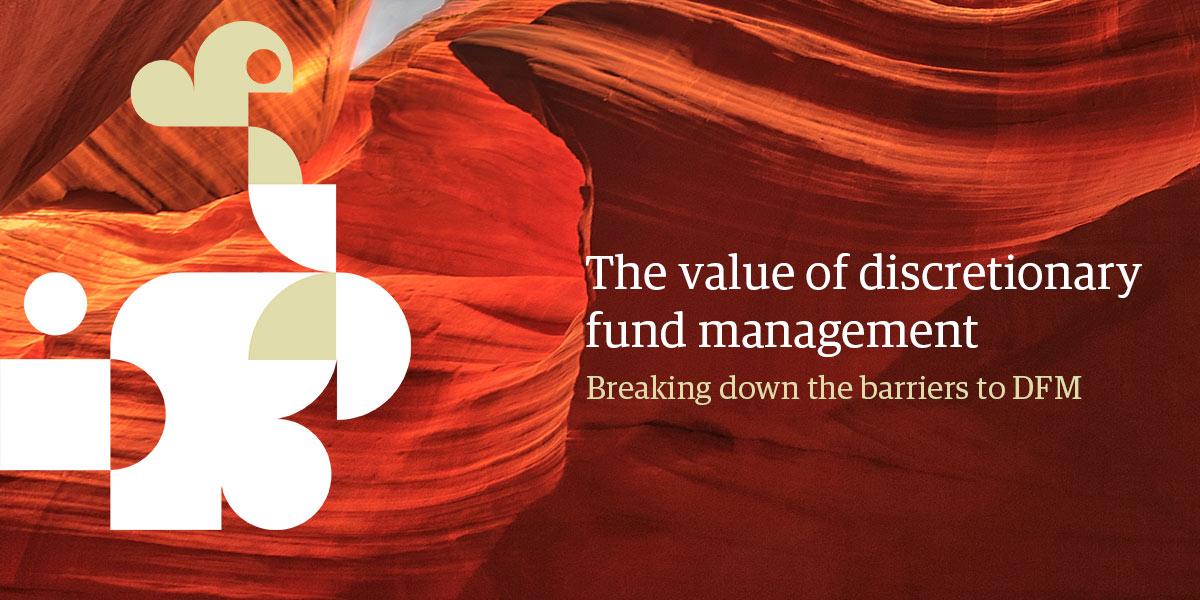Costs, performance and even fears of clients being stolen are all major concerns for advisers that have stood firm against the rising tide of third-party investment management services in recent years.

Breaking down the barriers to DFM
They are not particularly new. The same issues were cited two years ago when Rathbones looked at some of the issues holding financial advisers back from adopting a discretionary fund manager (DFM). With the trend towards these third-party services showing no signs of slowing, clearly the industry needs to do more to clear up some of the misunderstandings around the impact a DFM has.
The negative perceptions around using an external investment manager are perhaps understandable; until recently there had been little research done into the impact this could have on adviser businesses. The latest Rathbone report into the Value of DFM seeks to debunk some of these long-held misconceptions.
Unsurprisingly, the key barrier listed by advisers to taking up the DFM model is, you guessed it, the cost.
In fact, more than a third (36%) of the 100 advisers surveyed by CoreData for Rathbones’ report said that the cost of using an investment specialist or DFM was simply “too great”.
This was closely followed by another cost consideration, with 35% of advisers worried they would struggle to justify their own advice fee on top of the cost for external investment management.
While costs are undoubtedly important, the belief that low cost equals good value is one of the biggest myths in investment, not just for DFMs. The obsession with price often overshadows the things that matter more for clients, such as securing value for money. Rather than examining costs like-for-like, it is the full cost of providing a service that is important. This means considering everything from management fees and fund charges to platform fees.
Without fully understanding the value an investment manager can add with their resource and expertise, how can an adviser know if they have secured real value for clients? For more than 72% of advisers surveyed in our latest research, investment performance had improved since adoption, a hint at the added value on offer.
As for advisers that worry about justifying their own fees, the survey also revealed more than half (58%) of advisers that had outsourced to a third party said revenues had increased as a result of spending more time with clients. This suggests they had reinforced their own value in the process.
One of the biggest misconceptions surrounding adoption of a DFM is that it is only suitable for high net-worth clients, where the cost of servicing offsets the fees paid. A number of options are available for advised clients, from multi-asset and multi-manager funds to managed portfolio services and model portfolios.
There are a multitude of different options with differing levels of minimum investment. Some multi-asset funds ask for only £1,000 minimum and other managed portfolio services will accept a minimum pot of £15,000 – hardly considered high net worth, particularly when pensions and ISAs are consolidated.
The research suggested that advisers who used a DFM were more likely to offer clients with smaller pots access to things like multi-asset and multi-manager funds than non-users (33% against 21%) with more advisers that had outsourced putting smaller clients into model portfolios than those that didn’t (18% against 9%).
At the smaller end of the scale some advisers have voiced fears of losing control of the investment or value chain as a major barrier to them outsourcing, with a vocal few even expressing concerns that a DFM would eventually steal their clients. But given the importance to DFMs of maintaining strong relationships with advisers, an attempt to steal clients seems unlikely. Add to this the fact that the latest data suggests DFM adoption ultimately leaves advisers with more time to spend meeting clients and managing relationships, and these myths of DFM adoption should hopefully fade.
The data has managed to dispel some of the misconceptions surrounding DFM adoption - more than half (55%) of advisers using DFMs feel their clients trusted them more and three-quarters (76%) say they are more comfortable with their client base. There are still some staunch critics of DFM, but only 18% of those surveyed said nothing would make them change their mind about using a third party. Improvement on the cost front, as well as performance, transparency and availability of products, would all help prompt some advisers to make the shift. Ultimately, good performance is what’s needed to silence the critics.
Download the first chapter of our DFM research report - The value of discretionary fund management.

